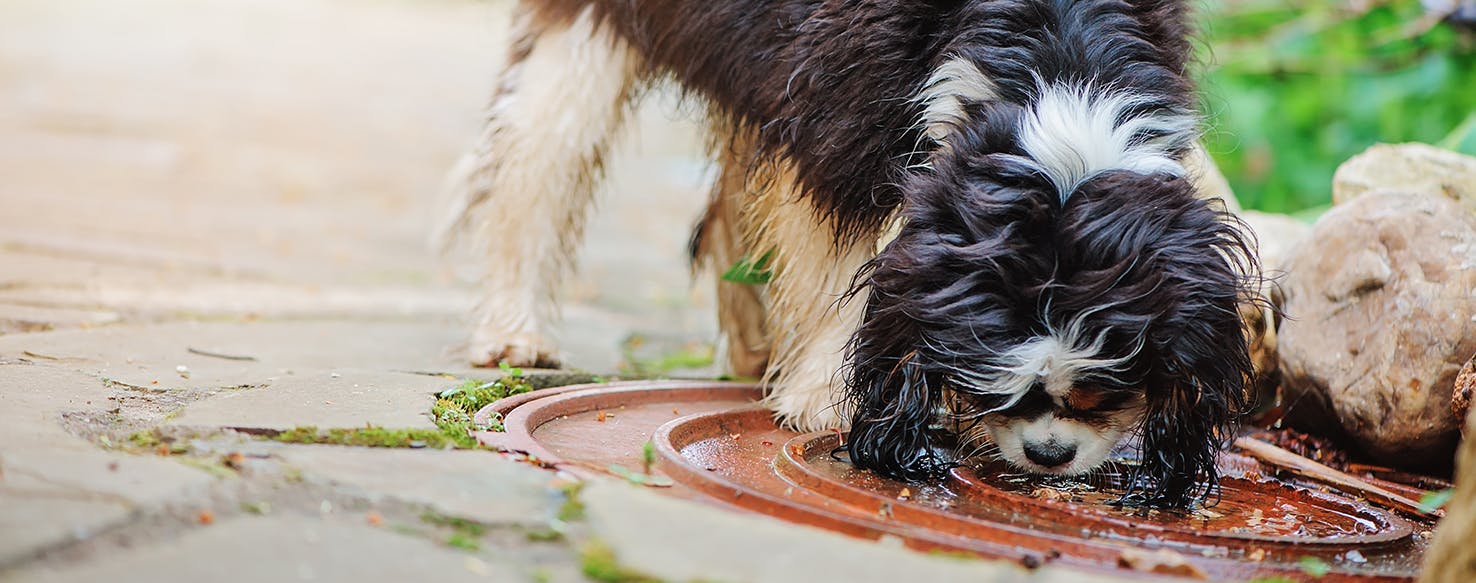- Home
- Dog Wellness
- Dehydration in Dogs: What Every Owner Needs to Know
3 min read
Dehydration in Dogs: What Every Owner Needs to Know

Save on pet insurance for your pet
You don't have to choose between your pet and your wallet when it comes to expensive vet visits. Prepare ahead of time for unexpected vet bills by finding the pawfect pet insurance.
Water is a necessity of life. It is crucial to bodily function in that the liquid keeps our digestive systems operating and our organs performing at top-notch capacity. Water is eliminated from the body through urination and sweating, and thus, it must be replenished regularly.
In the animal kingdom, the processes of water and the body work the same way. The importance of your dog drinking an adequate amount of water per day is the same as it is for humans. What are the risks of dehydration in dogs?
Why Dehydration in Dogs Can be Deadly
Dynamic water, whizzing around in the bloodstream, plumping up cells, being excreted by the kidneys, and being replaced by moist food and drinking water: this is the cycle of water consumption in dogs.
When replacement water is not available, the body adapts. The kidneys recycle water from the bloodstream and body tissues become more concentrated. This is great in the short term, but in the long term, causes toxins to build up, thereby initiating complications with organ function. Taken to its ultimate end, dehydration thickens the blood, reduces the circulation to the organs, causes toxin buildup, and creates microclots that clog up the lungs and organs causing death. Quite simply, the body cannot function for more than a few days without water.
Dehydration isn't an all-or-nothing condition and can range from mild to extreme. However, it is crucial to recognize the tell-tale signs early, so you can set about correcting the condition.
Signs of Dehydration in Dogs
It's a simple equation. If your dog loses more water than they take in, they become dehydrated. Thus, some dogs are at greater risk than others, for example, the vomiting dog that can't keep fluids down or the diabetic dog that produces lots of urine. These dogs lose a lot of water and if they don't drink, they will quickly dehydrate.
Alternatively, a normal dog on a hot day loses heat by panting and the evaporation of saliva. This increased loss of water needs to be replaced by drinking more.
Signs that a dog is on the 'net loss' side of this math and is dehydrated include:
-
Skin tenting: To check, gently pinch a fold of skin on the back of your dog's neck or shoulders. When you let go, the skin should instantly spring back into place. If your dog is dehydrated, the skin is less elastic and takes longer to fall back in to place.
-
Dry mouth: Lift your dog's lip and press a finger to their gums. Dry or tacky gums are a sign of dehydration.
-
Reluctance to move: This a general sign caused by the dog feeling ill.
-
Sunken eyes: A serious sign of severe dehydration can be seen in the eyes.
-
Collapse: Seek urgent veterinary attention!
Avoiding Dehydration in Dogs
Prevention is better than cure, so make sure your dog always has fresh drinking water available. Remember that elderly, stiff dogs may be too sore to get up and drink regularly, so provide them with water bowls close to their favorite snoozing spot. Also, if your dog needs to drink often (perhaps they have diabetes or a kidney problem), be sure to put lots of water bowls all around the house. Check regularly that the bowls haven't been knocked over and are topped.
Change the water at least once a day so that it's fresh and appetizing. Some dogs find moving water more inviting to drink, in which case invest in a pet drinking fountain. Some dogs dislike the taste of chlorinated water from the faucet. Try letting the water stand in a jug for 24 hours before putting it down to drink (the chlorine evaporates off) or give your dog mineral water.
In hot weather, always take a large bottle of water out on walks, and be sure to stop regularly to offer your dog a drink.
And Finally...When to Seek Help
If you suspect your dog is dehydrated but they refuse to drink or can't keep water down, then contact your vet immediately. If they are losing large amounts of fluid in diarrhea or urine, then get professional help. The underlying issue needs addressing to stop the upset tummy or to diagnose why they are peeing more, and intensive support with intravenous fluids may be necessary.
Don't take risks with dehydration! Remember, water is vital to life and a net loss of water can kill. If you are worried about your dog's health, always contact a vet.
You may also like
